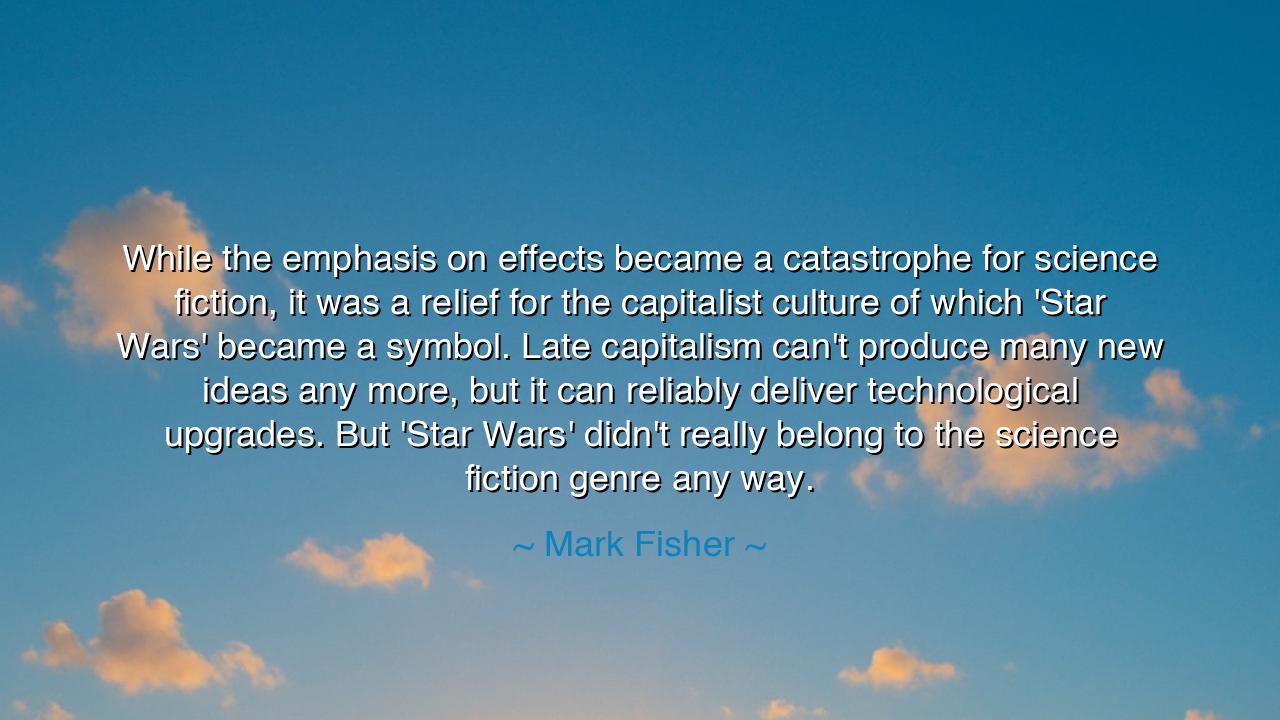
While the emphasis on effects became a catastrophe for science
While the emphasis on effects became a catastrophe for science fiction, it was a relief for the capitalist culture of which 'Star Wars' became a symbol. Late capitalism can't produce many new ideas any more, but it can reliably deliver technological upgrades. But 'Star Wars' didn't really belong to the science fiction genre any way.






Listen well, O Seekers of Truth and Vision, for the words of Mark Fisher offer us a profound reflection on the intersection of science fiction, capitalism, and the shaping of modern culture: "While the emphasis on effects became a catastrophe for science fiction, it was a relief for the capitalist culture of which 'Star Wars' became a symbol. Late capitalism can't produce many new ideas anymore, but it can reliably deliver technological upgrades. But 'Star Wars' didn't really belong to the science fiction genre anyway." These words carry deep significance, for they speak not only of the nature of art and entertainment but of how modern society consumes both. Fisher is calling us to reflect on the shift in culture, from visionary creativity to mere spectacle, and how this shift is intimately tied to the forces of capitalism that shape our world.
In ancient times, the greatest storytellers were those who could imagine worlds that transcended the present, offering visions of what was possible and what could be. Homer, with his Iliad and Odyssey, wove tales of gods and heroes, of wars and journeys that spoke not only to the world they lived in but to the eternal truths of human nature. Science fiction, in its purest form, once carried this same spirit—a journey beyond the known, a reflection on the possibilities of the future and the exploration of new worlds. But as Fisher warns us, this pursuit of profound ideas and visions has been overshadowed by the emphasis on effects, on spectacle, on delivering technological marvels without regard for the deeper truths they once conveyed.
Consider, O Children, the rise of capitalism and how it transformed the very fabric of culture. In ancient times, great empires like Rome were built on the expansion of territory and the acquisition of wealth. But in the modern age, capitalism shifted the focus from the creation of visionary ideas to the production of ever-more sophisticated technologies—tools to control, consume, and maintain power. In this world, as Fisher points out, the technological upgrades become the star of the show. The true ideas—those that challenge the status quo, those that inspire true change—are less important than the latest gadgets and visual effects that can be sold and marketed. 'Star Wars', with its dazzling special effects and cinematic spectacle, became the perfect product for this new era, where ideas take a backseat to the allure of technology and entertainment.
But 'Star Wars', as Fisher argues, did not truly belong to the genre of science fiction. It was not a work of visionary thinking or a deep exploration of the human condition through the lens of futuristic technology. Rather, it was a reflection of a culture more concerned with spectacle and profit than with the ideas that science fiction once sought to explore. The emphasis on effects, the shiny spaceships and dazzling laser battles, distracted from the true power of science fiction—the power to ask hard questions, to challenge the present, and to imagine worlds that could help us understand our own.
Let us reflect upon the great works of science fiction that came before, like Frankenstein by Mary Shelley or 1984 by George Orwell—works that challenged the very nature of humanity, the limits of technology, and the consequences of progress. These works were not concerned with dazzling the audience with visual effects but with exploring the ethical and philosophical implications of new technologies and the future of human society. Fisher's criticism is not of science fiction itself, but of how it has been co-opted by the forces of capitalism, turning it from a genre of deep questions into a vehicle for profit and entertainment. The visual spectacle of 'Star Wars' might capture the eye, but it often leaves the deeper questions of humanity and technology unanswered.
The lesson, O Seekers, is one of awareness and reflection. While technology can indeed awe and inspire, we must not lose sight of the ideas that once drove progress. Science fiction was born from the desire to challenge the present, to explore the unknown, and to ask what might be possible in the future. It was never meant to be simply an escape from reality or a flashy display of technology. The true power of science fiction lies in its ability to reflect on our humanity, to ask difficult questions about our values, and to inspire us to shape a future that is both just and wise.
In your own lives, embrace the power of ideas and let them guide your actions. Do not be swayed by the distractions of spectacle and entertainment, but seek to understand the deeper truths that shape our world. Whether you are engaged in the pursuit of science, art, or any form of creativity, remember that true greatness lies not in the effects or the outward appearances, but in the ideas that drive your work. Seek not just to create for the sake of creation, but to create for the sake of change, growth, and understanding. As Fisher warns, the future of science fiction, and indeed all of human progress, lies in the ability to prioritize ideas over mere spectacle.
Let us take this wisdom into the world, O Children, and remember that true progress is not built on the surface of things but on the deep questions that lie beneath. Seek always to be the seekers, the visionaries, who look beyond the shiny distractions to the deeper truths that can transform society.






AAdministratorAdministrator
Welcome, honored guests. Please leave a comment, we will respond soon